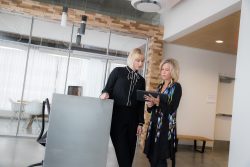When we’re approached about possible organizational consulting work, it’s clearly a two-way interview. You’re trying to decide if you trust us, in multiple ways.

- Do you trust that we understand what’s most important to you?
- Do you trust that we have what it takes to help you get there?
- Do you trust that you can be open and vulnerable with us?
- Do you trust that we can relate well to other members of your organization, to gain their trust and respect?
At the same time, we’re trying to decide if we think we can be of service, and if you’re the kind of leader and leadership team we can work well with. Here is some of what we’re looking for:
- Are you and your team willing to see us as a partner and collaborator, rather than a vendor? The quality of our relationship is critical. Change isn’t easy. We need to work hand-in-hand. Are you committed to what it takes to have a truly collaborative relationship? To be open and vulnerable with each other, to support and challenge each other, to respectfully raise issues when and if they arise?
- Do you and your team understand that real change takes time, and are you therefore committed to an ongoing engagement? Our focus is on true organizational and individual capacity building. You cannot microwave development. Awareness does not equal change. We can lead a dynamite three-day offsite meeting with you and your senior leaders, and that’s a great start, but it’s only a start. Nothing has actually changed yet. Real capacity builds through ongoing iterative cycles of action and reflection. Are you committed to the long haul of real change? That doesn’t mean that we need to move into your office! It does mean that we maintain our engagement over time, working with you and your team as necessary to help you reach your goals.
- Are you and your team committed to organizational alignment? Most leaders look at their teams as collections of individuals, rather than as systems. It is vital that all leaders see themselves as having at least two functions: handling their individual roles, and also being co-responsible for the overall functioning of the team on which they sit, or of the organization as a whole if they sit on the senior team. This is required to actually have a leadership team. The foundation of taking a systemic approach is what we call organizational alignment. It starts with being clear on the organization’s purpose. What are you here to do, stated simply and clearly? You and your team then identify the most important strengths in achieving that purpose, as well as the challenges, and then craft strategies/plans to mutually address the challenges (as much as possible) while building on the strengths in service of your purpose. This may sound simple, but very few organizations actually do it. Or, if these questions are raised, rarely is there enough psychological safety to have the discussions be truly meaningful. Our “thinking tools” also help raise the level of thinking in these dialogues.
- Are you and your team committed to culture change? All organizations already have a culture, but rarely is that culture intentionally formed, and rarely is it well aligned with organizational objectives. Culture is formed largely by what leaders pay attention to, and drives most of organizational behavior. Are you committed to working with us, and your senior leaders, to determine your optimal culture and then taking conscious action to support it? Including modeling the right behavior, even when it’s difficult? Are you committed to an organizational culture deeply imbued with psychological safety and trust, where rich integration of multiple differing perspectives is expected, and each organizational member can and does share their best ideas? And one where it’s OK to make mistakes but unacceptable not to then identify, analyze and learn from them?
- Are you and your team value driven? Does it deeply matter to you that your organization has real values (not just those empty and lifeless ones that often live only on laminated cards, and the entryway to your buildings), and that you and your leaders hold yourselves and each other accountable to lead in alignment with them? Is authenticity truly important to you, and do you see authenticity as foundational for great leadership?
- Are you and your team committed to your own growth? Our models are all designed to assist in leading even more effectively during times of increasing volatility, uncertainty, complexity, ambiguity and rapid change. See Our Tools. Will you work with us to keep upgrading your operating system, so that we can then work together to assist your other leaders in doing so? Is it vitally important to you that you lead in accordance with your deeper values? Are you committed to your physical, psychological, cognitive, emotional and spiritual health?
- Are you and your team committed to individual and collective reflection? Capacity building requires ongoing cycles of action and reflection. Ideally every morning we decide what’s most important, and at the end of the day we take a few minutes to review the day and ask how we did. Even better, or in addition to that, 30 seconds before any meeting we ask ourselves, “What’s my desired outcome? And given that, what’s my plan?” We then take action (hopefully mindful action, remembering what we decided), and at the end take 30 seconds to reflect on what actually happened and what we can learn from that. These reflective cycles need to be both individual and collective. They are important for many reasons including to celebrate what went well (something we rarely do) and to identify what we can do to be even more effective in the future. Are you willing to model reflection, and to build it into your culture?
- Are you and your team committed to the growth of others? Is it deeply important to you that everyone around you thrives, that they are happy and engaged, not just because that leads to better organizational outcomes and profit (although it does), but also because it’s an end in itself? Do you also understand that growing people and growing your organization’s effectiveness are inseparable?
- Are you people we would genuinely enjoy hanging out with? This is important in order to partner together effectively. Will it be enriching for us to work together? But if the answer is affirmative on #1 through #8, it’s highly likely!
Please contact us to discuss whether we’re a “good fit.” If you think you are, please review our Client Agreement

